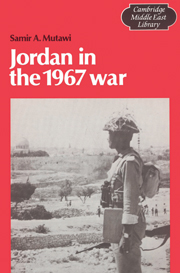Book contents
- Frontmatter
- Contents
- Preface
- Acknowledgement
- Map 1 The Hashemite Kingdom of Jordan
- Map 2 Operations on the Jordanian Front, 5–7 June 1967
- Map 3 The Campaign in Jerusalem, 5–7 June 1967
- 1 The decision-making process in Jordan
- 2 The principles and practice of Jordanian foreign policy
- 3 Friends and enemies: Jordan in inter-Arab affairs
- 4 Samu
- 5 The gathering crisis
- 6 On the brink of war
- 7 The war
- 8 The war in perspective
- 9 The aftermath
- 10 Conclusion
- Appendix Timetable for the movement of Iraqi forces to Jordan
- Biographical note
- Notes
- Bibliography
- Index
- Frontmatter
- Contents
- Preface
- Acknowledgement
- Map 1 The Hashemite Kingdom of Jordan
- Map 2 Operations on the Jordanian Front, 5–7 June 1967
- Map 3 The Campaign in Jerusalem, 5–7 June 1967
- 1 The decision-making process in Jordan
- 2 The principles and practice of Jordanian foreign policy
- 3 Friends and enemies: Jordan in inter-Arab affairs
- 4 Samu
- 5 The gathering crisis
- 6 On the brink of war
- 7 The war
- 8 The war in perspective
- 9 The aftermath
- 10 Conclusion
- Appendix Timetable for the movement of Iraqi forces to Jordan
- Biographical note
- Notes
- Bibliography
- Index
Summary
The seeds of the idea for this book, and indeed the seeds of the war itself, were sown at the first Arab summit conference in Cairo in 1964. Like many fellow Arab journalists, I was excited to be covering an event that marked, for all intents and purposes, the beginning of a new era of Arab politics, and more importantly, of joint Arab action. I had grown up in the 1950s and early 1960s with feelings of great frustration over the fragmentation of Arab opinion on the Palestinian question and the total lack of understanding of Jordan's legitimate defence problems against Israel.
To most Arabs, the summit represented a real opportunity of overcoming these problems, particularly as Nasser himself had called for the conference. Nasser was seen at that time, by the Arab masses and intellectuals alike, as the only leader capable of uniting the Arabs in their common goal of facing up to the Israeli danger.
While talking to some officials who had attended the closed sessions, I had discovered that the Syrian head of state had accused the Arab leaders of cowardice because they refused to confront Israel. He claimed that Palestine could be liberated in six hours if they did decide to fight. Even with my little knowledge of military logistics, this exaggeration was difficult to swallow. To drive a car from Safad in the north to Gaza in the south, would probably require twice as long. How then, I thought, could an Arab leader think he could overrun Israel in six hours? I left Cairo with grave doubts, despite the general euphoria surrounding the summit.
This unease remained with me, and on the morning of 5 June 1967 it proved fully justified.
- Type
- Chapter
- Information
- Jordan in the 1967 War , pp. ix - xiPublisher: Cambridge University PressPrint publication year: 1987

